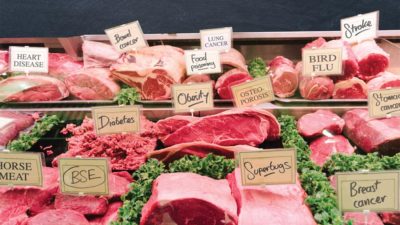The case against meat
Evidence is mounting against red and processed meat with links to all Western diseases
A comprehensive review of major studies on red and processed meat consumption presents a very convincing case against meat-based diets. The accumulated evidence links red and processed meat consumption to diabetes, coronary heart disease, heart failure, stroke, several types of cancer and premature mortality.
Red meat includes beef, veal, pork, lamb and mutton; processed red meat includes ham, sausages, bacon, frankfurters, salami etc – meat that has undergone treatment (curing, smoking, salting or the use of chemical preservatives and additives) to improve its shelf life and taste.
Based on all data this study used, the consumption of 100 grams of red meat daily (less than one pork or lamb chop or less than a half of an average steak) increases your risk of stroke and breast cancer by 11 per cent, fatal heart attack or stroke by 15 per cent, colorectal cancer by 17 per cent and advanced prostate cancer by 19 per cent.
The consumption of 50 grams of processed meat daily (three to five bacon rashers, a small sausage or less than a burger) increased the risk of prostate cancer by four per cent, mortality from cancer by eight per cent, breast cancer by nine per cent, colorectal cancer by 18 per cent, pancreatic cancer by 19 per cent, stroke by 13 per cent, fatal heart attack or stroke by 24 per cent, type 2 diabetes by 32 per cent and the risk of premature death by 22 per cent.
And of course, the more meat, the higher the risk! There are many mechanisms at work, including toxic and carcinogenic compounds, natural meat components causing harmful reactions in the body and more. For more information see our brand new report Meat the Truth.
The study also highlights that the production of red meat is a considerable environmental burden and all countries should implement policies to limit consumption.
Wolk A, 2017. Potential health hazards of eating red meat (Review). Journal of Internal Medicine. 281: 106–122.





